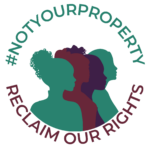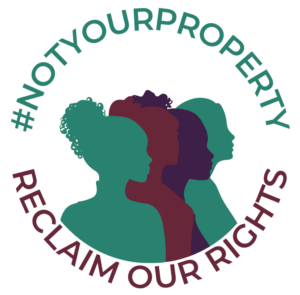#NotYourProperty
Reclaim Our Rights
Our Rights. Our Power. Our Freedom.
In Lebanon, the plight of migrant domestic workers (MDWs) within the confines of the Kafala system is a stark reminder of the pervasive issue that is modern-day slavery. Building upon the momentum generated by migrant-led movements, such as Egna Legna's significant achievement with their campaign against sexual harassment, the Reclaim our Rights Collective is launching its #NotYourProperty campaign to continue shedding light on the deeply rooted problem of violence against women with a particular emphasis on sexual violence endured by migrant women at the hands of employers, agents, authorities and even the broader society.
Reclaim Our Rights' Message
Today, as the Reclaim Our Rights Collective, we launch the #NotYourProperty campaign focusing on a deeply entrenched issue in Lebanese society: sexual violence against Migrant Domestic Workers in Lebanon. Central to the campaign is the recognition of the fundamental right of every migrant worker to live free from violence and with the full enjoyment of their rights. As a collective, we stand firm in our resolve to shine a light on this silent epidemic and demand meaningful change. We underscore the imperative for a sweeping cultural shift to prevent and combat sexual violence and exploitation emphasising that this responsibility rests on society as a whole. We stand firm in our call for collective action to ensure the safety, equity, and full participation of migrant women in Lebanese society.
We believe it is crucial to highlight a fundamental aspect of our campaign, which is the recognition of our humanity and dignity as migrant women of colour. While we reject the notion of being someone's property, sadly this is the reality of how Lebanese society often perceives and treats us. This dehumanising treatment strips away our dignity, but it cannot erase the inherent worth and dignity we possess.
We seek to shed light on the insidious exploitative practices embedded within the Kafala system. From its inception, the sponsorship system subjects migrant workers to objectification, commodification, and exploitation. Practices such as recruitment agents taking photographs of us and circulating them to potential employers, reduce us to mere images for selection as commodities. Many employers openly admit to basing their decisions on our looks, revealing the disturbing reality that our worth is judged solely on our appearance. So many stories have emerged of employers boasting about having "bought" us and asserting their absolute control over us, emphasising that their choice was based purely on superficial criteria. These practices underscore the urgent need to challenge the dehumanisation and objectification of women migrant domestic workers inherent in the Kafala system.
We have been subjected to numerous forms of sexual violence at the hands of employers, agents, and authorities in Lebanon. These acts include but are not limited to, sexual harassment in both public and private transport, catcalling on the streets and racial sexualisation. Many of us face sexual slurs and are often wrongly assumed to be sex workers solely because of our race. The violence escalates to physical and psychological abuse, including sexual assault, rape, indecent exposure and digital and online sex crimes (such as cyberflashing). These acts compound the trauma of exploitation and objectification, making it imperative to address the systemic abuse enabled by the Kafala system and to advocate for the rights and dignity of migrant women in Lebanon.
By equipping our communities to take the lead in driving change, we aim to work towards an end to sexual violence against migrant women in Lebanon, dismantle victim-blaming attitudes, advocate for migrant survivors, challenge toxic behaviours, demand accountability, and promote a deeper understanding and adherence to genuine consent.
Key messages of the
#NotYourProperty campaign
ROR underscores the fundamental right of every migrant woman to live and work in Lebanon free from sexual abuse and exploitation within the Kafala system. We advocate for a sweeping cultural change to prevent and combat such abuses, emphasising the collective responsibility we all share in ensuring the safety and dignity of migrant workers and justice for those who have been affected. It is crucial that the voices of migrant women are heard, not only due to their heightened vulnerability to these harmful behaviours but also because the values they derive from their experiences will shape our society's future.
1) Believe and Support Migrant Women.
ROR is committed to providing support and assistance to survivors of sexual violence. We recognise the immense difficulty survivors face in disclosing such incidents, often struggling with fear, distress, and victim-blaming attitudes, particularly in the context of the Kafala system where many live isolated lives. As allies, it is imperative to respond with empathy, belief, and unwavering support when survivors come forward.
2) Don't Stand By. Speak Up.
ROR challenges the pervasive silence within Lebanese society regarding sexual violence endured by women migrant domestic workers. We denounce the sexualisation of migrant women, affirming that we are more than domestic workers, we are individuals deserving of respect and dignity. We must collectively address the normalisation of sexual violence, including behaviours sexualising migrant women, sexual harassment in transport, the restriction of rights within the employers’ homes and the daily violence against women. It is the collective responsibility of Lebanese society to actively call out those who perpetuate sexual violence towards all women, including migrant domestic workers.
3) Come to Our Table.
ROR calls for systemic change by highlighting sexual violence within the Kafala and the need to include migrant women in the fight against sexual violence. We encourage Lebanese civil society to be intersectional in their approach. We invite broader inclusion of migrant voices in discussions and policy development related to sexual violence. We reject tokenism and stress the importance of meaningful participation, underlining the indispensable role of migrant workers as contributors to impactful policy development. We invite collaboration with Lebanese civil society to achieve radical change together.
Background: Why is this important?
Sexual violence remains a pervasive and pressing issue for many migrant women working under the Kafala system in Lebanon. There is a dearth of reliable information around sexual violence in Lebanon including within the migrant community. This is due in part to the general distrust in the authorities, the prevalence of a victim-blaming culture and the precarious situation of migrant workers.
Migrant women in Lebanon have endured an extensive amount of different types of violence, including physical attacks, coercion, harassment, breaches of privacy, and sexual violence. Egna Legna's groundbreaking research revealed a troublingly high frequency of these occurrences within the Kafala system, with numerous incidents remaining unreported due to concerns about detention and repercussions. Their findings uncovered that 68% of migrant domestic workers experienced at least one instance of sexual harassment. Sexual violence is generally under-reported but we believe it to be even less reported by the most vulnerable and marginalised in society.
In 2021 Lebanon’s parliament passed Law 205, which criminalised sexual harassment and created a fund at the Ministry of Social Affairs for support and rehabilitation for survivors of abuse. The law was called "one of the best of its kind in the region" due to its broad definition of sexual harassment and its inclusion of sexual harassment in the workplace. The Lebanese Criminal Code contains provisions criminalising certain aspects of sexual violence, namely “forced sexual intercourse”, with various aspects falling short of international standards. Yet, perpetrators continue to carry out acts of sexual violence with all impunity and Lebanese authorities have shown no awareness or political will to tackle the issue.
However, migrant women continue to find themselves in a vulnerable position, grappling with the challenges of navigating a foreign environment while enduring the constant threat of sexual violence. Once in Lebanon, they are confronted with exploitation, discrimination, insecurity, and violence. The deep power imbalances created by the Kafala system contribute to their vulnerability to abuse and further impede their access to justice. It is imperative to highlight the urgency of addressing these issues and to eradicate the harmful behaviours that perpetuate the cycle of sexual abuse and exploitation within the Kafala system.
"... he started to pat me down as if he was searching for money. Then it began. He ripped off my clothes, beat me, put a gun to my head and then he raped me. He threw me on the side of the road completely naked. I don’t remember much in the moments after but a young couple helped me and sheltered me. The next day they took me to Sa***."
"All I remember is waking up to 4 men, including my employer violently raping me. I was fighting to move but my body could not help me. At this moment all I could think was who would believe me? Where should I run to? Who could believe me? With what strength I do not know but I got up and ran."
"An immigration officer secured my release and employed me in his family home near the Lebanon-Syria border. Finally, my situation changed, but it turned into a nightmare. I was sexually assaulted and raped by the officer's brother regularly when the family was not around. He would attack me while I was doing chores or even in the middle of the night. The abuse and fear drove me to the brink, and I decided to run."
"One day they forgot to lock the door and I ran. I was on the street begging for help. One Lebanese man came to my rescue. He took me to his home and I finally felt safe. Then he raped me. Then I ran again. I was petrified and crying. I ran into women from my community. All I did was cry. After a while, I told the others what happened to me. I had an STI from the rape. They kicked me from the house because they were afraid it was contagious."
"The man looking after us hit me. He touched me in places I did not want. Then me and the other women were raped by all the men. Then they took us to Lebanon. I don’t know what happened to these other women. I had some medical checks and found out I was pregnant because of the rape. I didn’t know. The agent took me to get an abortion."
WHAT’S NEW
Artwork by Hawa-Jane Bangura.
Hawa-Jane Bangura owns the rights (including copyright) of the licensed images
Instagram: @hawa_jane
© Reclaim Our Rights [2024] by MWA and ROR
Our Rights. Our Power. Our Freedom.
#ReclaimOurRights



